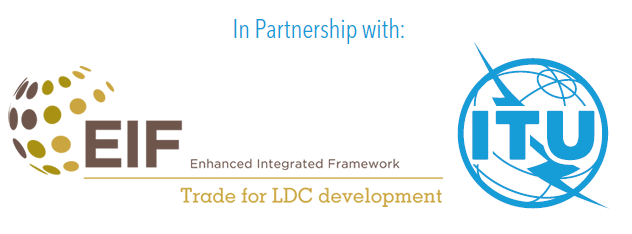3.2 Africa
Access to digital skills is the most common practice (4 out of 6 practices covering this policy area), followed by access to digital technology (2 out of 6 practices), and access to infrastructure and digital services (2 out of 6 practices). Four (out of 6 practices) target women and girls, specifically.
Table 3: Access to digital skill, technology, inclusion, entrepreneurship, infrastructure and services: Africa
| Practice | Access to digital technology | Access to digital skills | Financial inclusion | Entrepreneurship and leadership | Access to infrastructure and digital services |
| Silicon Mountain Community (Cameroon) | X | X | X | ||
| First coding camp of the African Girls Can Code Initiative (Ethiopia) | X | ||||
| The Virtual University of Senegal (Senegal) | X | X | |||
| Empowering Adolescent Girls and Young Women through Education (Tanzania) | X | X | |||
| Community network for rural connectivity and access for women (Zimbabwe) | X | ||||
| ‘Women’s Bank’ to ensure women’s access to money at concessionary rates (Zimbabwe) | X |
Key highlights
Activities
| Trainings on coding, digital literacy, personal development skills. Other topics include mathematical operations, communicating in English and Swahili, life skills, sexual and reproductive health, HIV and AIDS, gender equality, entrepreneurship and financial management skills, environmental and civic and human rights education. | |
| E-learning combined with presence-based training. | |
| Youth-led mentorship. | |
| Use of role models to address discriminatory norms. Organize national media campaigns around this topic. | |
| Gender mainstreaming workshops. Advocate for inclusion of gender mainstreaming into national curricula. |
Resources
| Infrastructure available (e.g., Open Digital Spaces) to facilitate access to digital resources and IT tools. | |
| Women involvement in the setting up of infrastructure, management, day-to-day administration of servers and installation services at different sites. | |
| Laptops with mobile Internet connection provided by a university grant. | |
| Free high-speed Wi-Fi offered. | |
| Smartphones provided to former participants of trainings. | |
| Credit at concessionary rates made available for women, relying on the infrastructure of national institutions such as the post office to reach rural areas. |
Collaboration and partnerships
| Stakeholders: National Post Office; Ministry of ICT; ICT regulator; Ministry of Finance; private and public banks. | |
| Collaboration with international organizations to implement practices (e.g., UNESCO, UN Women, UNFPA, UNICEF, ITU). | |
| Partnerships with institutions to offer internships to women and girls. |
The Silicon Mountain Community (Cameroon), identified by World Bank as an initiative with high potential for women, is centred around academic institutions.50 It provides youth-led mentorship as well as training on coding; partnerships with institutions offer the availability of internships. The government offered a one-year free high-speed Internet access to members of the community. To scale up this initiative, the World Bank recommended creating digital corridors with other digital entrepreneurship ecosystems.
The first coding camp of the African Girls Can Code Initiative (Ethiopia) equipped young girls with digital literacy, coding, and personal development skills. A workshop on gender mainstreaming was conducted in Addis Ababa and an online platform developed following the national camps. The project, implemented by UN Women Ethiopia in collaboration with the African Union and ITU, with the support of the government of Denmark in its first year, advocates for ICT, coding and gender equality to be mainstreamed into national curricula. It also implemented national media campaigns involving women role models to address discriminatory norms.
The Virtual University of Senegal (Senegal), first public digital university in Africa, combines e-learning with presence-based tutorials and networking. Laptops with mobile Internet connection provided by university grants.
51 Open Digital Spaces as innovative infrastructures, connected to optical fibre, equipped with the latest generation hardware, designed to familiarize and facilitate, access to digital resources and IT tools.
The Joint Programme on Empowering Adolescent Girls and Young Women through Education (Tanzania) adopted a collaborative, coordinated and multi-sectoral approach to ensuring girls’ and women’s right to quality education.
52 Youth clubs and peer-led activities serve as safe spaces for counselling and training on mathematical operations, communicating in English and Swahili, life skills, sexual and reproductive health, HIV and AIDS, gender equality, entrepreneurship and financial management skills, environmental and civic and human rights education. Smartphones are provided to former participants. Implementation is led by UNESCO, in collaboration with the government of Tanzania, UNFPA and UN Women; funded by the Korean International Cooperation Agency (KOICA).
The Community network for rural connectivity and access for women (Zimbabwe) is based on a cybercafé housed, developed by residents skilled in welding, art, and paintwork. It offers an affordable access to their e-learning material for a USD 1 per hour for an unlimited connection. Women are involved in the setting up of infrastructure, management, day-to-day administration of servers and installation services at different sites. The government, through the Postal, Telecommunications and Regulatory Authority (POTRAZ), donated laptops and computers. Zimbabwe Community Network Initiatives (ZCNI) offered expert knowledge in the building of community networks, together with Zimbabwean Ministry of ICT and Courier Services, POTRAZ, UNICEF, and ITU.
The ‘Women’s Bank’ ensures women’s access to money at concessionary rates (Zimbabwe)The bank’s primary clientele are women, although it can also extend credit to disadvantaged men and other micro borrowers. The bank has opened branches nationwide by relying on the infrastructure of the Zimbabwe Post Office, which has a presence in every corner of the country, including in rural areas.

